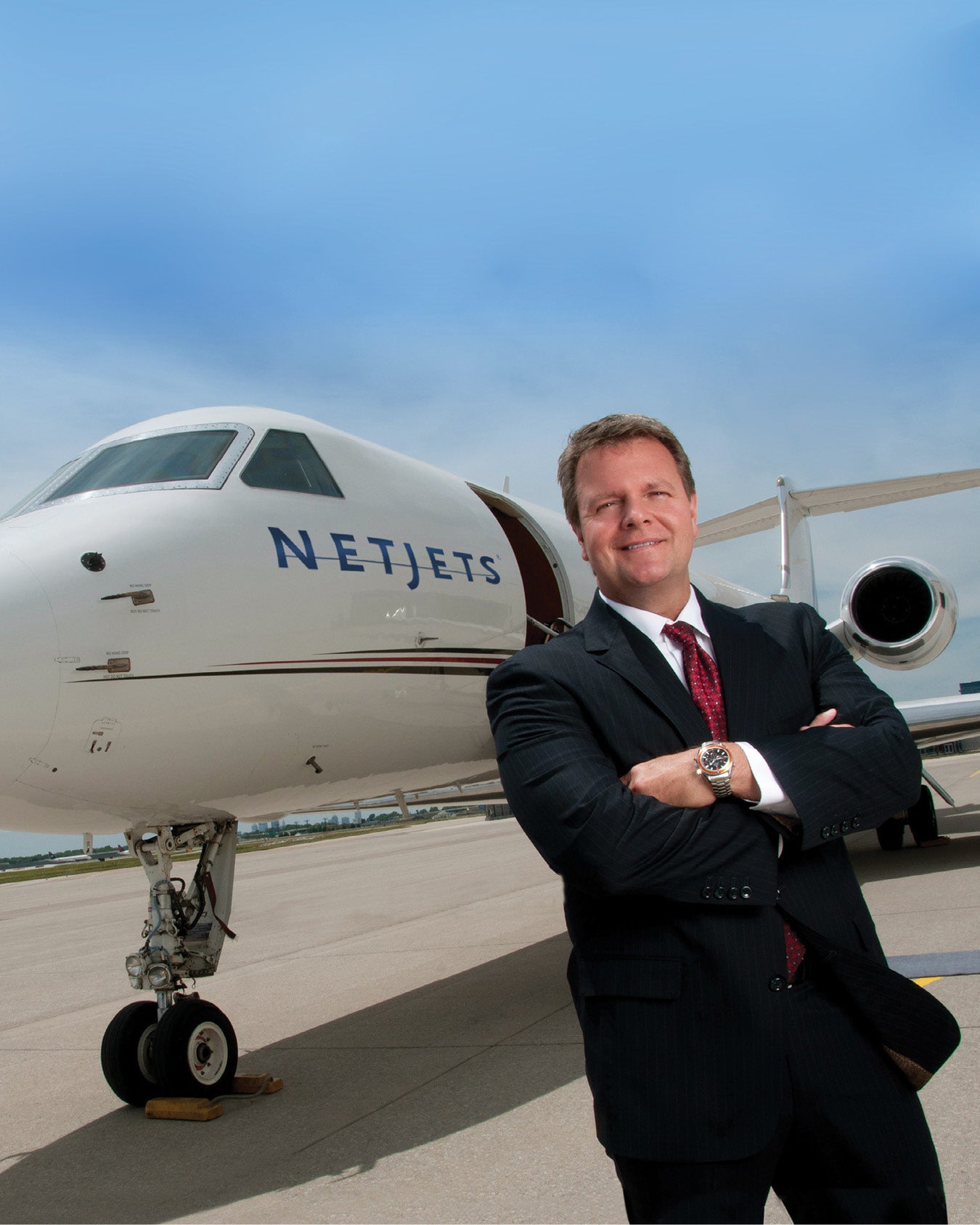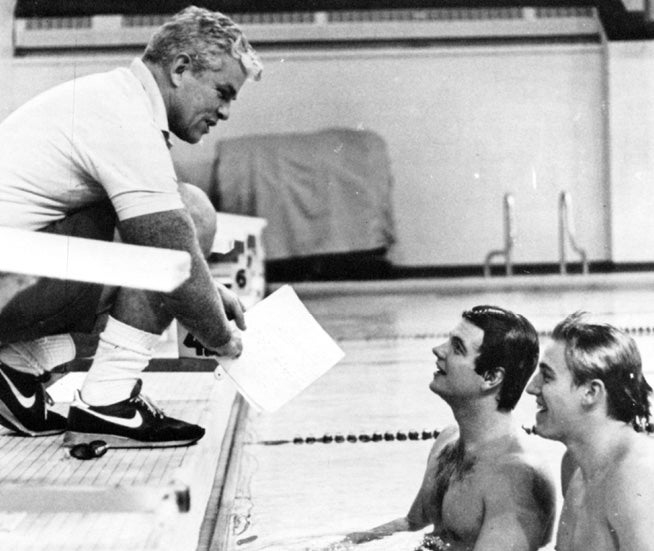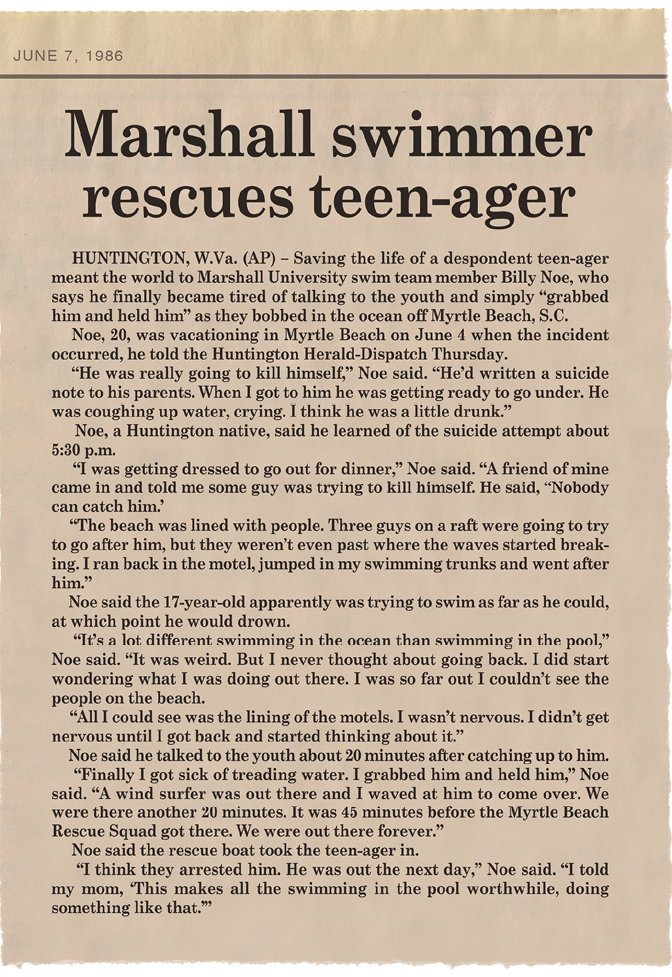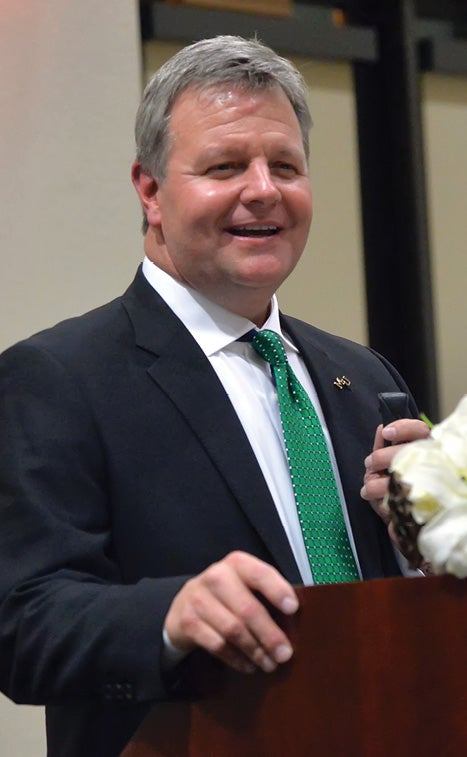
Bill Noe went from a speedster in the swimming pool to a shark in the boardroom as President and COO of NetJets. Today, he has his sights set on new horizons.
When he was 4 years old, little Billy Noe was swimming with some other children at Huntington’s Olympic Pool when, off in the distance, he eyed the high-diving platform hovering some 16 feet over the deep end. He decided to give it a try and marched the length of the pool, climbed the ladder, walked to the edge and hurled himself toward the water. As his body was flying through the air, whistles began screeching from down below as lifeguards tried in vain to stop him from jumping from such an imposing height. They immediately dived into the water to fish him out, but once again were too late as Billy zipped across the water and casually climbed out of the pool. That summer day at the Olympic Pool would be the first sign of the steely resolve he would use to propel himself to the highest levels of success as both an athlete and a businessman.
Bill Noe, now 52, has always been a risk taker. The former standout swimmer for Marshall recently stepped down after a 23-year career at NetJets, culminating with an eight-year stint as the company’s president and chief operating officer. NetJets, owned by renowned billionaire Warren Buffett, has the largest fleet of private jets in the world.
Originally founded in 1964 as Executive Jet, the company implemented a unique business model starting in 1986 that changed the way some of the world’s biggest movers and shakers fly. The concept is called fractional ownership. Instead of buying their own private jet, individuals purchase a share of a plane. Depending on the size of their share, they are guaranteed access to the jet for a certain number of hours each year. If an owner needs to fly somewhere, they simply call NetJets and the plane will arrive at their local airport within four hours.
“Our business was getting people on a jet, taking them where they want to go and having it be a pleasant experience,” Noe explained. “It was also about giving them that ‘wow’ factor. Our customers included some of the most famous and influential people in the world.”
The story of how Noe made his way from the deep end of Huntington’s Olympic Pool to a spacious office at the NetJets world headquarters in Columbus, Ohio, is compelling. And, like most success stories, it is a study in hard work, determination, passion and fate.
Bill Noe was born in Ashland, Kentucky, and grew up in Huntington. His father, William E. Noe Sr., was a salesman, and his mother, Francis A. Noe, a nurse anesthetist.
Following his daring leap from the high dive at the Olympic Pool that hot summer day, Noe was approached by YMCA Swim Coach Bob Shaw about joining the team. So, at the ripe age of 5, Noe began his career in the pool. He took to water like a moth to a flame and in the years that followed would set a bevy of pool, city and state records.
“I always loved the water and I loved to compete,” Noe explained. “Although it’s a team sport, it’s all up to the individual as to how well they perform. For me, racing the clock was everything.”
By the time he was a teenager, it was not uncommon for Noe to be in the pool each day from 5:30-6:30 a.m. before school, and from 4-6 p.m. after school.
“I learned about work ethic by watching my parents,” Noe said. “My dad would leave on Monday and come back on Friday. My mom would often leave for work at 4 a.m. and was the kind of person who never said no if somebody needed a shift filled. The one person I really looked up to was my father. He reminded me of John Wayne – he was tough, but he had a soft side. People loved him. You can’t learn that kind of charisma.”
 During his senior year of high school, Noe qualified for several events at the YMCA Nationals held in Ft. Lauderdale, Florida. He placed in every race he entered and finished second in his signature event — the 200-yard Butterfly. Noe’s performances at the meet capped off a stellar senior season. After fielding scholarship offers from dozens of colleges across the country, including Ohio State and Florida, he ultimately decided to stay in Huntington and swim for Marshall’s charismatic coach, Bob Saunders.
During his senior year of high school, Noe qualified for several events at the YMCA Nationals held in Ft. Lauderdale, Florida. He placed in every race he entered and finished second in his signature event — the 200-yard Butterfly. Noe’s performances at the meet capped off a stellar senior season. After fielding scholarship offers from dozens of colleges across the country, including Ohio State and Florida, he ultimately decided to stay in Huntington and swim for Marshall’s charismatic coach, Bob Saunders.
“Bill was one of the most exciting recruits we ever had in our program,” Saunders said. “He was being wooed by a lot of big-time colleges, and we were afraid we wouldn’t get him. Bill was so versatile that we could use him in nearly any race. He was such an easygoing kid and never caused me any problems. He is certainly one of the greatest swimmers Huntington has ever produced.”
Noe’s respect for his coach was one of the main reasons he chose to swim for the Thundering Herd.
“I thought Coach Saunders was the best coach I’d ever come across, and I had a lot of good ones,” Noe said. “He had the highest level of integrity, and he translated that into coaching. He garnered a lot of respect because of his loyalty to his team. If anyone tried to mess with one of his guys, he was the first to stand up for you. You just wanted to do well for him.”
Noe peaked as an athlete during his freshman year. When the time came for the biggest meet of the year, usually held at the end of the season, he shifted into another gear. As a result, records often fell.
Such was the case entering the 1983 Southern Conference Swimming Championship held at Marshall. To prepare for the big event, Noe and his teammates shaved their heads and bodies as a way to reduce their drag in the water. It worked. Noe set three pool, school and conference records while leading Marshall to the Southern Conference Championship. He also won the championship’s “Most Valuable Swimmer” award.
“That is something I will never forget,” Noe said. “I was very proud to be a collegiate athlete for Marshall University, and I still am.”
 While Noe may have been proud of his record-setting performances in 1983, he doesn’t mention that as the highlight of his swimming career. Instead, he points to a moment during his junior year of college. He was at Myrtle Beach during spring break when he learned that someone was trying to commit suicide by swimming far out into the ocean. Noe ran from his motel room and jumped into the water and began racing toward the young man. After swimming a mile from shore, he finally found the teenager.
While Noe may have been proud of his record-setting performances in 1983, he doesn’t mention that as the highlight of his swimming career. Instead, he points to a moment during his junior year of college. He was at Myrtle Beach during spring break when he learned that someone was trying to commit suicide by swimming far out into the ocean. Noe ran from his motel room and jumped into the water and began racing toward the young man. After swimming a mile from shore, he finally found the teenager.
“He was about to go under,” Noe recalled. “He was starting to take in water.”
Noe grabbed the kid and soon thereafter a windsurfer appeared. Noe then placed the teen on the windsurfer’s board, and the three waited until a rescue team arrived.
“The next day the kid came to my motel room and said, ‘I just want to thank you. I had too much to drink and was doing something stupid. I just really appreciate what you did.’ I got a letter from his parents afterwards. I never saw him again. I sometimes wonder if all those years in the pool were preparation for that day.”
Noe was at a crossroads in 1987. He was a senior at Marshall but was burned out both in the swimming pool and in the classroom. Even though he was just one semester from graduating, he walked away from school and went to work for an industrial contractor.
“The offer came and I thought, ‘Why not?’ I really had this desire to get out and see the country, and that’s what I did. It was a risky move.”
As fate would have it, the owner of the company was a pilot who liked to fly in his spare time.
“One day the owner took me up in his plane and that sealed the deal for me,” Noe recalled. “I decided before we landed that flying was what I wanted to do with my life.”
Noe quit his job and made a beeline for Vero Beach, Florida, where he enrolled in flight school. He rented a rundown apartment near the beach that was filled with cockroaches.
“But that was OK with me,” Noe said. “I was flying and absorbing everything I could about aviation. I never looked back.”
In 1990, Noe traveled to Huntington to visit some friends and while there met Lisa Kidd. Much like his first time flying, Noe knew immediately that the woman was his destiny. The two were married 79 days later. Another risky move on his part?
“Not at all,” Noe said. “If I had it to do over again, I wouldn’t have waited so long to ask her to marry me.”
After completing flight school and earning his pilot’s license, Noe accepted a job as an instructor, but his long-term dream was to work for Executive Jet. However, the company (which changed its name to NetJets in 2001) required all its prospective pilots to have a minimum of 2,500 hours of flying time. Undeterred, Noe began building up hours and ultimately landed his dream job in 1993. He flew all across North America before entering the company’s international program. In the span of just two years he flew all over the planet, visiting every continent except Australia and Antarctica.
By this time the Noes had started a family. First, they welcomed Nicholas, now 20, and two years later Rylee, now 18.
“I flew a lot — I was gone for 28 days at a time,” Noe said. “Standing atop the Eiffel Tower or the Great Wall of China, I thought I was the most fortunate guy in the world. I remember thinking, ‘I can’t believe they pay me to do this.’ The only thing I didn’t like is that every time I went somewhere, I’d think ‘Man, I wish Lisa and the kids were here.’”
Noe’s desire to spend more time with his family became a reality when the company began taking notice of his leadership qualities in 1994. He was smart, hardworking and, much like his father, immensely likable. As a result, the company began grooming him for management positions. He was promoted to chief pilot of the Gulfstream program, which meant he would be spending less time in the air and more time behind a desk. The family then relocated to Hilton Head, South Carolina, when Noe was promoted to director of operations of NetJets International. He continued to climb the corporate ladder landing more prestigious titles along the way.
“Titles really never meant that much to me,” Noe said. “I was just doing my job. I see a lot of people in business trying to get to that next rung on the ladder. The way I look at it is you put the business and the people first. You do the best you can — and don’t worry about it. Everything else will come.”
Along the way Noe began acquiring the additional skills needed to succeed in the corporate world. He contacted Marshall and completed his final semester through online courses. He then enrolled in an accelerated finance course for executives at Columbia University.
In 2008, as the American economy started sinking into a recession, NetJets began to struggle. The company posted a loss of $711 million and was in serious trouble. As a result, Warren Buffett sent in his top lieutenant — David Sokol — to right the ship.
“It was quite a struggle to put the company back on track, and quite frankly, it couldn’t have been done without Bill Noe,” Sokol said. “When I started talking to all the pilots at NetJets, they all pointed to Bill as the leader they thought had the best understanding of the company. The loyalty and trust Bill commanded from the workers was paramount to the company’s eventual turnaround.”
 In 2009, Noe was named president and chief operating officer, which meant he handled the day-to-day operations. Eighty percent of the company’s 5,000 employees reported to him.
In 2009, Noe was named president and chief operating officer, which meant he handled the day-to-day operations. Eighty percent of the company’s 5,000 employees reported to him.
“People didn’t work for me; I worked for them,” Noe said. “Our organizational chart was upside down, which put me at the bottom. We were teammates. If you make decisions about what’s right for your team, it will pay off in the long run. The first thing you’re going to earn is their respect, then their trust, then their loyalty.”
Starting out as a pilot and working his way up through the company provided Noe with a unique perspective on how to lead.
“I didn’t fly after 2005. It wasn’t something I really wanted, but it was something I needed to do to make the business better,” he said.
His father’s influence was apparent in how Noe interacted with customers and coworkers — he has the rare combination of strength and charm.
“My philosophy over the years has been to be honest, fair and consistent. If you have a hard decision to make, the answer is probably in one of those three little words,” Noe said.
One of the highlights of Noe’s career was the opportunity to work for Warren Buffett, the chairman of Berkshire Hathaway of which NetJets is a subsidiary. The billionaire from Nebraska, often referred to as the “Oracle of Omaha,” is considered by many to be the most successful investor in the world today.
“Everything you’ve read about him is true,” Noe said. “He’s down to earth, immediately likable and puts everybody at ease.”
Sadly, neither of Noe’s parents lived long enough to see him achieve success in the business world. He lost his father in 1997 and his mother in 2003.
It’s a long journey from the deep end of the Olympic Pool to the upper echelon of corporate America, but Bill Noe has made the trek utilizing a unique set of skills. When he started at NetJets in 1993, the company had 20 planes. Today it has more than 800, with offices around the world. It also boasts an impeccable safety record. Noe said he is proud to have been a small part of the company’s ascent and attributes his own success to his love of his work and a laser-like focus.
“When you find something you’re passionate about, it’s not work anymore,” Noe explained. “My grandfather told me to find a hobby you can make a living at — and that’s what I did. I also have an intense focus; once something is radar-locked in my head, that’s it. Studying always came hard to me, and I think I have ADD to some extent. But when I went to flight school, Lisa couldn’t get me to go to a movie or the beach. If I wasn’t reading something about aviation, I felt like I was missing an opportunity.”
While his work has taken him to the four corners of the world, Noe contends that the standard of living in America far exceeds anything he has seen.
“There is no better place than the United States,” he said. “We are so fortunate, and we have everything. You can’t truly appreciate our country until you see the rest of the world.”
Reflecting on his time at Marshall, Noe says his favorite part was the camaraderie he shared with the other athletes he lived with on campus.
“A lot of people join a fraternity when they go to college. But when you’re in athletics, you have a fraternity automatically. We all lived in Hodges Hall and bunked together,” Noe explained. “The camaraderie we had was special. I also liked Marshall because the class sizes were small — the university was close knit. I learned so much both in and out of the classroom. I think that’s what the college experience is all about.”
One of the many friends Noe made while at Marshall was Brad Smith, a fellow student from Kenova, West Virginia, who also went on to find success in the business world as the CEO of software giant Intuit.
“Bill and I go way back. We were at Marshall together, took martial arts classes together and became fast friends,” Smith said. “I always admired Bill because he was constantly improving himself and he had a great deal of courage. He never backed down from anything and was always willing to take on the biggest challenge. What’s more, he encouraged those around him to try things they didn’t think were possible.”
Smith said it doesn’t surprise him at all that Noe has risen so high in the corporate world.
“Bill is to be admired because he is a self-made man. He has a tremendous work ethic and possesses strong values. It’s easy to see why the workers at NetJets admired him because he started out as a pilot and worked his way up through the organization. Because of that, he had empathy for every employee, he valued their contributions to the company and he cared about their well being. And that’s what it takes to be a world-class leader.”
As for what the future holds for Noe, he isn’t certain.
“I’m going to take a break,” he said with a smile. “When you give 100 percent of yourself to a job for twenty plus years it takes a toll on you. Our youngest child just went off to college, so Lisa and I are empty nesters now. I want to spend more time with her, travel and rest. But, I’m not someone who can sit still for too long. I’m sure I’ll be exploring some new horizons in the not too distant future.”
Jack Houvouras is the publisher of Marshall Magazine.
Photos: (Second from top) Coach Bob Saunders confers with Bill Noe (center) and Craig Endert. Noe began breaking city and state swim records as a child and continued to do so while in college at Marshall. Photo courtesy Marshall University. (Middle) The news clipping from Noe’s rescue of a teenager who had swum too far out to sea. (Below) Noe started as a pilot for NetJets and worked up to president and COO.